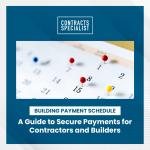
Building Payment Schedule: A Guide to Secure Payments for Contractors and Builders
By Contracts Specialist|April 12, 2023
Building Payment Schedule: Secure Your Payments on Time
Payment disputes are one of the common problems that arise in the construction industry. To avoid this, a building payment schedule is necessary to ensure that contractors, subcontractors, suppliers, and consultants get paid on time for their services.
What is a Payment Schedule?
A payment schedule is a written response to a payment claim issued by a claimant. It outlines when and how much the respondent (usually a builder or developer) will pay for the work done. Failure to provide a payment schedule can result in legal disputes and delays in the construction process.
Why is a Payment Schedule Important?
For claimants, a payment schedule is essential as it indicates when they can expect to receive payment for their work. Failure to receive payment within the set time frame can be a reason for adjudication. On the other hand, if you are a respondent, a payment schedule can protect you from dodgy claimants who may claim higher for the work they've done. Making a payment schedule will help you review their claim and give options on how you can repay your contractor.
Parts of a Payment Schedule
As prescribed by the Security of Payment Act, a payment schedule indicates the related payment claim, the time frame to pay the claim, and an explanation in case the respondent disagrees with the claimed amount. Supporting evidence for the explanation should also be provided.
Important Time Periods in Building Payment Schedule
When making or receiving a payment schedule, always take note of the time specified in the contract. This includes the exact date/s when payment should be made. If there is no indicated time, then the payment schedule should be done within ten business days after the claim's issue. Failure to reply to the payment claim within ten days can result in an adjudication case.
Common Mistakes to Avoid
To avoid legal trouble, it's important to avoid common mistakes such as failing to identify relevant sections of the law, failing to assess the claim with the contract, and failing to provide evidence to reduce the claim amount.
Best Practices
To avoid payment disputes, it's best to review relevant terms in the contract, provide sufficient evidence to support explanations, and provide the right price calculations needed to value construction work.
In conclusion, building payment schedules are essential to avoid payment disputes and ensure that contractors, subcontractors, suppliers, and consultants get paid on time for their services. It's important to understand the parts of a payment schedule, important time periods, common mistakes to avoid, and best practices to ensure that construction projects run smoothly without payment-related issues.
Payment disputes are one of the common problems that arise in the construction industry. To avoid this, a building payment schedule is necessary to ensure that contractors, subcontractors, suppliers, and consultants get paid on time for their services.
What is a Payment Schedule?
A payment schedule is a written response to a payment claim issued by a claimant. It outlines when and how much the respondent (usually a builder or developer) will pay for the work done. Failure to provide a payment schedule can result in legal disputes and delays in the construction process.
Why is a Payment Schedule Important?
For claimants, a payment schedule is essential as it indicates when they can expect to receive payment for their work. Failure to receive payment within the set time frame can be a reason for adjudication. On the other hand, if you are a respondent, a payment schedule can protect you from dodgy claimants who may claim higher for the work they've done. Making a payment schedule will help you review their claim and give options on how you can repay your contractor.
Parts of a Payment Schedule
As prescribed by the Security of Payment Act, a payment schedule indicates the related payment claim, the time frame to pay the claim, and an explanation in case the respondent disagrees with the claimed amount. Supporting evidence for the explanation should also be provided.
Important Time Periods in Building Payment Schedule
When making or receiving a payment schedule, always take note of the time specified in the contract. This includes the exact date/s when payment should be made. If there is no indicated time, then the payment schedule should be done within ten business days after the claim's issue. Failure to reply to the payment claim within ten days can result in an adjudication case.
Common Mistakes to Avoid
To avoid legal trouble, it's important to avoid common mistakes such as failing to identify relevant sections of the law, failing to assess the claim with the contract, and failing to provide evidence to reduce the claim amount.
Best Practices
To avoid payment disputes, it's best to review relevant terms in the contract, provide sufficient evidence to support explanations, and provide the right price calculations needed to value construction work.
In conclusion, building payment schedules are essential to avoid payment disputes and ensure that contractors, subcontractors, suppliers, and consultants get paid on time for their services. It's important to understand the parts of a payment schedule, important time periods, common mistakes to avoid, and best practices to ensure that construction projects run smoothly without payment-related issues.



